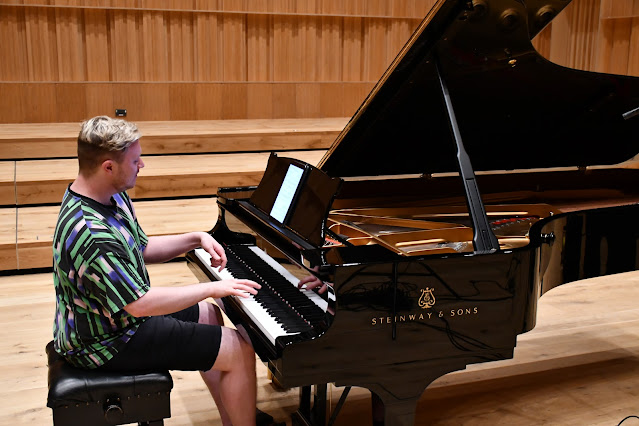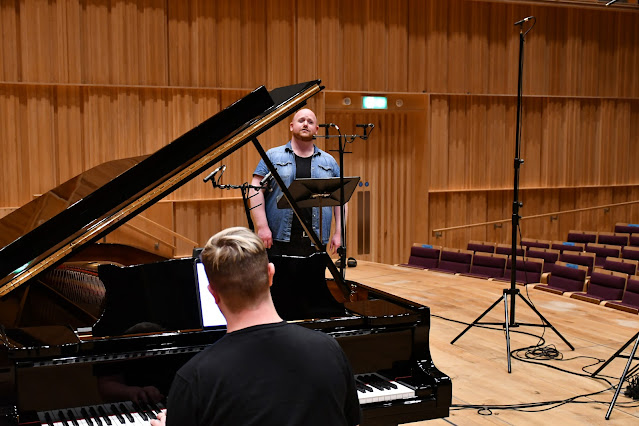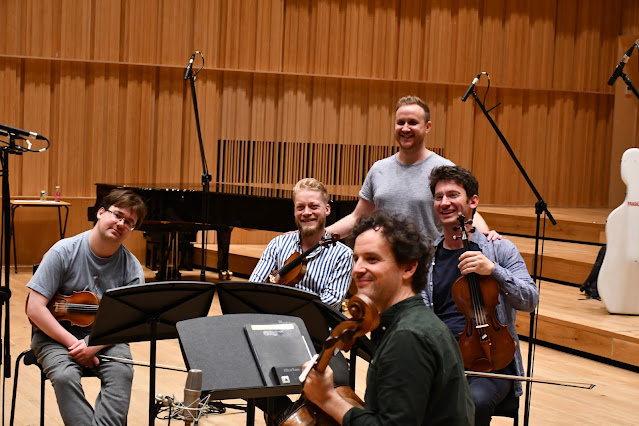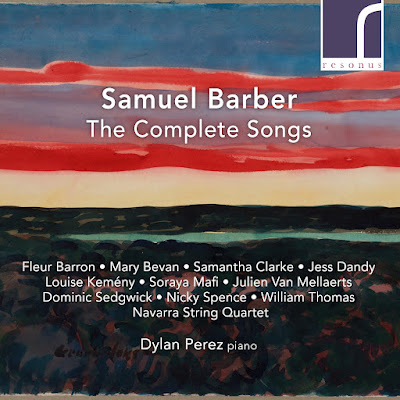 |
| Pianist Dylan Perez at the recording sessions for the complete Samuel Barber songs on Resonus Classics |
In May 2022, pianist Dylan Perez released Samuel Barber: the Complete Songs on Resonus Classics, a comprehensive survey of all of Barber's songs, both those published in his lifetime and those published posthumously, performed by sopranos Mary Bevan, Samantha Clarke, Louise Kemény, and Soraya Mafi, mezzo soprano Fleur Barron, contralto Jess Dandy, tenor Nicky Spence, baritones Julien Van Mellaerts, and Dominic Sedgwick, bass William Thomas, and the Navarra String Quartet. Dylan has been making a name for himself both as a pianist and as a curator of concert series, his Re-Sung at St John the Divine in Kennington, recently finished its latest season and with baritone Julien van Mellaerts, Dylan has again curated the Opera in Song recital series at Opera Holland Park. I recently met up with Dylan by Zoom to catch up.
The Barber song project came about partly because Dylan was bored during lockdown and was looking for a project. He had the complete Barber songs on his shelf, and loved the Barber songs that he had played. Add to this, many of the posthumously published songs were unrecorded. The Resonus set contains 36 songs which were published in Barber's lifetime and 29 that were published posthumously, including 19 that were previously unrecorded.
Dylan loves Barber's music, it has a very specific sound-world and is very American, and the posthumous songs give a real sense of how Barber ploughed his own furrow with his sound-world and harmonies. From Barber's early songs, Dylan thinks we can see how his is going to develop, pushing boundaries. And beyond the music, the song texts are very musically inclined; Barber was a great reader of poetry and great with languages, so that two of the songs set French texts. As with all great composers, Dylan feels that some of the songs are less amazing, but all have something to offer.
 |
| Pianist Dylan Perez and tenor Nicky Spence at the recording sessions for the complete Samuel Barber songs on Resonus Classics |
Dylan feels that as a song-composer, Barber is underrated. He should fit into the canon of 20th century song composers more, and his songs should be at the top of all singers' programmes. For Dylan, the lyric quality of Barber's songs is amazing. As far as the 20th century canon is concerned, Barber both fits in and stands out. He stuck to his compositional ideas without being involved or influenced by serialism and atonality. As with Rachmaninov, there are moments were there is harshness and dissonance in the music, but always within a vein of lyricism. He is akin to other 20th century American composers such as Ives and Copland, in that each has their own particular sound-world. Dylan doesn't see Barber as a neo-romantic, but he did have a romantic vein in his writing.
The recording uses a wide range of singers for the songs, some 10 in all. When planning the project, Dylan knew that he would have to ask more than just three singers, not only were there way too many songs but the ranges of the songs mean they need different voices. And, it was so big a project that he wanted people to be able to focus on a smaller group of songs rather than having to learn 25. But he also feels that it is far more effective to hear lots of different voices in a wide range of repertory. The selecting of the singers simply went from there. He listened to recordings of the songs, and decided who fitted what. Everything fell into place.
As well as the songs with piano, the disc also includes two of Barber's best-known vocal works, the Malcolm Arnold setting Dover Beach (performed by Julien van Mellaerts and the Navarra Quartet) and Knoxville: Summer of 1915, originally written for soprano and orchestra but recorded in the composer's piano reduction with tenor Nicky Spence. By casting a tenor, Dylan felt that it would give a new perspective to the text and a different flavour to the song. The song sets a text by the American novelist and poet James Agee (1909-1955) in which Agee looks back on his childhood, so it is written from a man's perspective. Dylan thought it would be interesting to see what it sounded like sung by a man, and feels that there is no reason why it should not be sung by a tenor. Whilst a tenor voice makes the piece sound more earthy and gives it gravitas, Dylan also admits that it would make the recording stand out from a marketing point of view. He had played the piano reduction before and feels that it works well. It brings out the colours and lines of the original even though it does not have the fullness of texture.
If he were to explore more complete sets, then it would be songs by American composers as he feels that there is a gap in the knowledge of these in the UK. He describes the idea of recording the complete songs of Copland or of Ives as cool, and feels that more modern composers such as Dominick Argento (1927-2019) would also be interesting. And simply recording a selection of songs would be interesting too, after all it is rather stressful tracking down all the available songs and finding people to learn them.
 |
| Baritone Julien van Mellaerts and Navarra String Quartet at the recording sessions for the complete Samuel Barber songs on Resonus Classics |
Last year, Dylan and baritone Julien van Mellaerts curated Opera in Song at Opera Holland Park, a song recital series that illuminated opera in song and the series is back this year with an expanded season from 28 June to 3 July 2022. They have Carmen in Song, where the operatic heroine is illuminated via the music of Ravel, Poulenc, Granados, Ginastera and Massenet, and Unsung Heroines, an evening of song by women composers as a benefit for a local women's charity, Solace Women's Aid. there are all three Schubert song cycles with a range of pianists and singers - Julien Van Mellaerts and James Baillieu in Die schöne Müllerin in the original language, Roderick Williams and Ella O’Neill in Winterreise in Jeremy Sams’ English translation, Winter Journey, and BBC New Generation Artists Ema Nikolovska and Kunal Lahiry in Schwanengesang with the world premiere of The Lake, composed by Errollyn Wallen.
In response to Opera Holland Park giving the UK premiere of Mark Adamo's Little Women this Summer, the Opera in Song series concludes with an American Song Gala with soprano Francesca Chiejina, mezzo-soprano Kitty Whately, tenor Frederick Jones, baritone Alex Otterburn and Dylan on piano in a range of American song from art song to Broadway. It is an evening which Dylan hopes will show what American song can sound like and how operatic it can be, with lots of interest including music rarely sung in the UK.
Then on 4 July, Nicky Spence and Dylan will be performing Barber's Knoxville at Wigmore Hall as part of a programme that focuses on Scottish and American music. The excuse for this, if one were needed, is that Dylan and Nicky got married earlier this year, and the recital comes right after their honeymoon. So there will be songs by the neo-Romantic American composer Charles Griffes (1884-1920) setting words by Fiona Macleod, pseudonym of the Scottish writer William Sharp (1855 - 1905), Britten's song cycle Who are these Children? setting texts by the Scottish poet William Soutar (1898–1943), Margaret Bonds' Songs of the Seasons, setting words by Langston Hughes and finally some Sondheim. Then later on Nicky and Dylan have a residency at the Copenhagen Opera Festival.
Dylan always wanted to be a pianist; he started at the age of five and didn't ever stop practising, his parents had to tell him to stop. When his friends were hanging out, he would be practising and he loved it. He comments that he has a different relationship with the piano now, but he still loves it. And whilst he plays chamber music occasionally, his main interest now is song. He loves song and he loves text.
He started out doing solo piano as an undergraduate at the University of Michigan, and became a bit burned out, lonely and uninspired. He had to take a piano accompaniment module as part of the degree, and after this was encouraged to continue. A masterclass with pianist Martin Katz changed how he thought about the piano and his relationship to it. Concentrating on accompanying saved him from being disillusioned by solo playing.He came to the UK to study at the Guildhall School of Music in 2014. He wanted to get out of the United States, the country's sheer size made it difficult to have a career as a song accompanist. But he also wanted to come to the UK and experience the European ideas about accompaniment, to get a new perspective on how to play song. He feels that the UK tradition is very different to the American one. Dylan sees the song accompaniment tradition in the USA as being collaborative but in service to the singer, helping them out. So that for Dylan it still feels like the piano took a different part of the stage to the singer.
But in the UK, song accompaniment is more collaborative, the piano is at the fore-front. And Dylan became interested in marrying the two traditions. He sees American tradition as being about gesture, using a large paint brush and vivid colours to draw the emotion out. Whereas in the UK, there is a more detailed approach, more finesse using small brush strokes. But he emphasises that this is only his experience, and others might feel differently.
When I ask about his heroes, he says he has always loved the pianist Artur Rubinstein and Marta Argerich. Regarding singers, the list is enormous but when he first heard Leontyne Price on disc he was mesmerised, he could not believe anyone could make that sound. And this was the moment that he became obsessed by voices
Samuel Barber: The Complete Songs - Mary Bevan, Samantha Clarke, Louise Kemény, Soraya Mafi, Fleur Barron, Jess Dandy, Nicky Spence, Julien Van Mellaerts, Dominic Sedgwick, William Thomas, Navarra String Quartet, Dylan Perez - Resonus Classics
Never miss out on future posts by following us
The blog is free, but I'd be delighted if you were to show your appreciation by buying me a coffee.
Elsewhere on this blog
- Closeness & distance: Friedrich Cerha's evocation of Viennese traditional music in a new version for Viennese Schrammel quartet - record review
- Never such innocence: Benjamin Hewat-Craw & Yuhao Guo in RVW, Butterworth & Gurney - record review
- The Lost Art of Frances Cole: recordings from the 1970s provide a glimpse of the art of the Black American harpsichordist - record review
- Giving voice to unconventional instruments: the Lawrence Graduate Bayreuth Tuben Quintet - record review
- Madcap theatre & magnificent music: Janacek's The Excursions of Mr. Brouček at Grange Park Opera - opera review
- A strong affinity to melodic music: I chat to composer John Brunning about his works for guitar - interview
- Strong meat: Grange Park Opera stages Ponchielli's rarity, La Gioconda in a performance that full embraces the work's drama - opera review
- Rising to the challenge: the Young Artists of the National Opera Studio in Sondheim: Before & After - opera review
- Vivid & vibrant: Poul Ruders' Harpsichord Concerto from Mahan Esfahani, Aarhus Symphony Orchestra, Leif Segestam - record review
- Young Artists performance of Tchaikovsky's Eugene Onegin at Opera Holland Park - opera review
- On a highly concentrated scale: Verdi's Macbeth at The Grange Festival - opera review
- Baroque mind games: Handel's Tamerlano at The Grange Festival - opera review
- Violinist Midori Komachi has not only recorded Vaughan Williams' Violin Sonata but is planning performances of the composer's music in Japan - interview
- Home












No comments:
Post a Comment